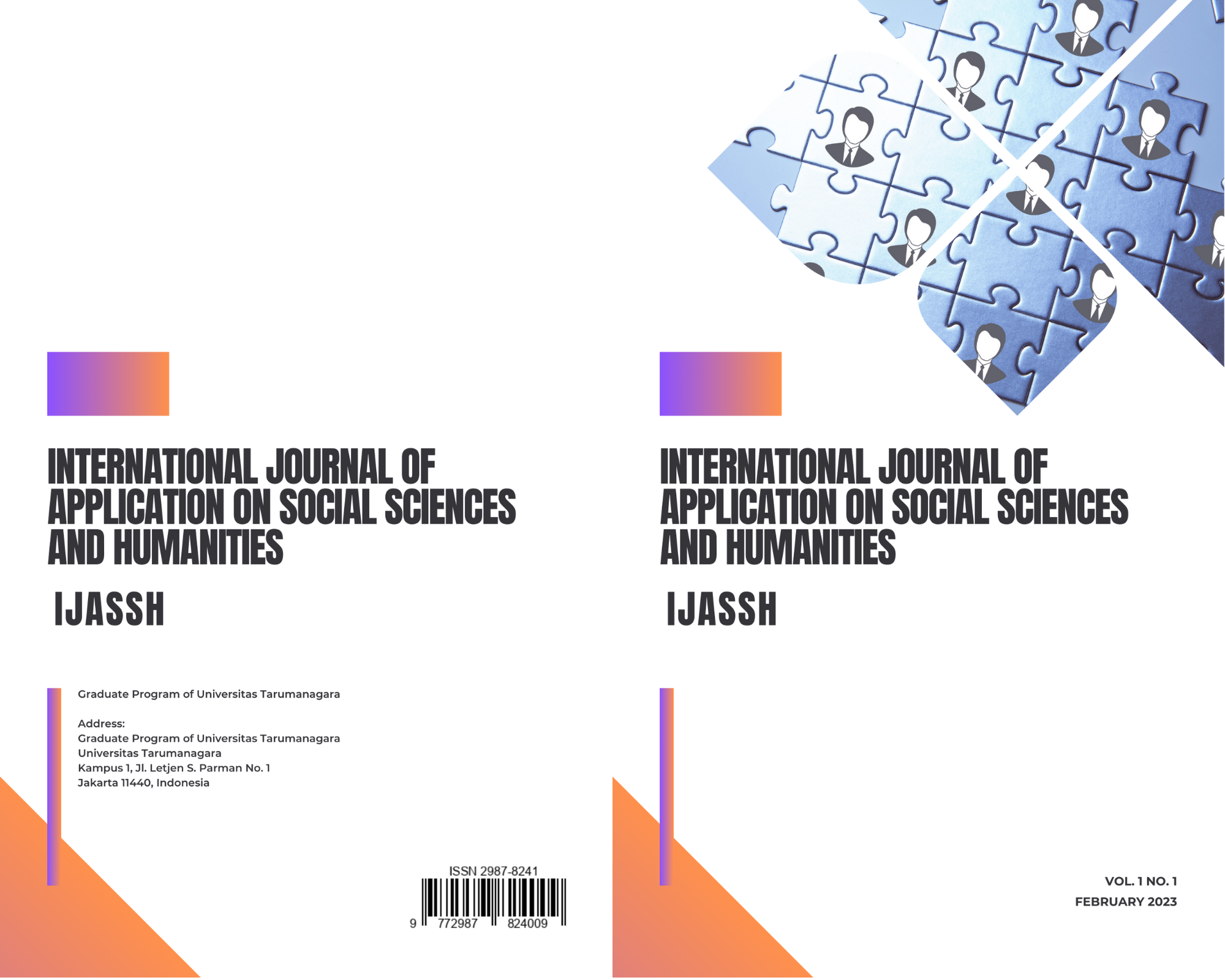A Descriptive Study of Work–Family Conflict among Employees who Adopt Hybrid System Working at PT. X
Main Article Content
Abstract
One issue that occurred at PT X was that most married employees faced difficulties in balancing between work and family issues. When they have to complete a lot of work at the office, they will not have the time to complete the household chores. Besides this, they also felt stressed as well. This phenomenon is called work-family conflict. The aim of this current study is to illustrate the work–family conflict that faced by the married employees adopting the hybrid working system at PT. X during the pandemic. This study used quantitative methods and used Work–Family Conflict Scale (Carlson et al., 2000) to measure the work–family conflict. There were 100 participants in this study and the majority of them were males. Results indicated that the overall mean and each of the three dimensions (time–based, strain–based, and behavioral–based) of work–family conflict are considered high. This result can be used as inputs for the management of PT X to think of a few ways in combating this conflict.
Article Details
Section

This work is licensed under a Creative Commons Attribution-NonCommercial-ShareAlike 4.0 International License.
References
Ansori A. N. A, (Mei 2022). “Update covid–19 hari ini 1 Mei 2022, kasus positif bertambah 244, meninggal 16”, Liputan6, [Online], Available: https://www.liputan6.com/health/read/4953699/update-covid-19-hari-ini-1-mei-2022-kasus-positif-bertambah-244-meninggal-16
Ainurrofiq I, dan Amir T. M, (Maret 2022). “Penerapan hybrid working model terhadap perubahan budaya kerja dan nilai organisasi”, Fair Value: Jurnal Ilmiah Akuntansi dan Keuangan, vol. 4, no. 8, pp. 3355-3368. https://doi.org/10.32670/fairvalue.v4i8.1387
Bumulo R. O, Stefany and Widjaja D. C, (2018). “Analisa pengaruh work family conflict terhadap tingkat stres kerja dan kinerja karyawan wanita di hotel bintang 4 dan 5 di Surabaya,” Jurnal hospitality dan manajemen jasa, vol. 6, no. 2.
BKN, (Juni 2022). “Hierarchy of needs theory sebagai dasar kebijakan work from anywhere (WFA)” BKN, [Online], Available: https://www.bkn.go.id/hierarchy-of-needs-theory-sebagai-dasar-kebijakan-work-from-anywhere-wfa/ [Accessed: 4 September 2022)
Carlson D. S, Kacmar, and Michele K, (1999). “Construction and initial validation of a multidimensional measure of work-family conflict” Journal of Vocational Behavior, vol. 56, no. 2, pp. 249-276, 2000. DOI:10.1006/jvbe.1999.1713
CNN Indonesia, (December 2021). “Setahun lalu pasien pertama Covid-19 ditemukan”, CNN Indonesia, [Online], Available: https://www.cnnindonesia.com/internasional/20201204124554-113-577951/setahun-lalu-pasien-pertama-covid-19-ditemukan-di-wuhan
Frone M. R, Russell M, and Cooper M. L, (1997). “Relation of work family conflict to health outcomes: A four-year longitudinal study of employed parents” Journal of Occupational and Organizational Psychology, vol. 70, no. 4, pp. 325 – 335. DOI:10.1111/j.2044-8325.1997.tb00652.x
Fontinelle A, (February 2022). “The Economic Impact of a Hybrid Office”, Investopedia, [Online], Available: https://www.investopedia.com/the-economic-impact-of-a-hybrid-office-5200417. [Accessed: 4 September 2022]
Greenhaus J, and Beutell N. J, (1985). “Source of conflict between work and family roles,” The Academy of Management Review, vol. 10, no. 1, pp. 76 – 88. DOI:10.2307/258214
Hasanah F. S, and Matuzahroh N, (2017). “Work family conflict pada single parent” Jurnal Muara Ilmu Sosial, Humaniora, dan Seni, vol. 2, no. 1, pp. 381-398, DOI: http://dx.doi.org/10.24912/jmishumsen.v1i2.972
Iqbal K. M. J, Khalid F, and Barykin S. Y, (2021). “Hybrid Workplace: The Future of Work”, Research Gate, July. DOI: 10.4018/978-1-7998-8327-2.ch003
karyawan pada masa pandemik COVID-19,” Jurnal Ilmu Pendidikan, vol. 3, no. 5, pp. 3229- 3242, 2021. DOI: https://doi.org/10.2568/yum.v4i2.1050
Kementerian Komunikasi dan Informatika, (Juni 2021). “Kebijakan work from home secara penuh di Kantor Pusat Kementerian Kominfo”, Kominfo, [Online], Available: https://kominfo.go.id/content/detail/35132/siaran-pers-no-214hmkominfo062021-tentang-kebijakan-work-from-home-secara-penuh-di-kantor-pusat-kementerian-kominfo/0/siaran_pers
KEMKES, (September 2022). “Pertanyaan dan Jawaban Terkait COVID-19” Kementerian Kesehatan Republik Indonesia, [Online], Available: https://www.kemkes.go.id/folder/view/full-content/structure-faq.html. [Accessed: 4 September 2022)
Majid A. A, (Juni 2021).“Protokol Kesehatan 5M dan Kesehatan Imun untuk Hadapi Varian Baru Covid-19”, Kemenkeu, [Online], Available: https://www.djkn.kemenkeu.go.id/kanwil-jateng/baca-artikel/13981/Protokol-Kesehatan-5M-dan-Kesehatan-Imun-untuk-Hadapi-Varian-Baru-Covid-19.html/. [Accessed: 5 September, 2022]
Narpati B, Lubis I, Meutia K. I, Dan Ningrum E. P, (Maret 2021). “Produktivitas Kerja Pegawai oleh Work From Home (WFH) dan Lingkungan Kerja Selama Masa Pandemik”, Jurnal Ilmiah Manajemen Forkamma, vol. 4, no. 2, pp. 121 - 133. DOI: http://dx.doi.org/10.32493/frkm.v4i2.9808.
Natalia P, and Suharnomo S, (2015). “Analisis pengaruh work family conflict dan ambiguitas peran terhadap kinerja karyawan dengan stress kerja sebagai variabel intervening (Studi pada karyawan wanita bagian produksi PT. Nyonya Meneer Semarang),” Diponegoro Journal of Management, vol. 4, no. 2, pp. 1-3.
Puji A, (September 2021). “Stres dan cemas berlebih bisa sebabkan tekanan darah tinggi”, Hellosehat, [Online], Available: https://hellosehat.com/jantung/hipertensi/stres-menyebabkan-hipertensi/
Ramadhani A. A, (2018). “Hubungan antara beban kerja dengan work family conflict pada pekerja wanita perusahaan garmen di Jawa Tengah,” Strata Satu, Fakultas Psikologi dan Ilmu Sosial Budaya, Universitas Islam Indonesia, Yogyakarta. https://dspace.uii.ac.id/handle/123456789/10526
Sabiila I. S, (Maret 2022). “Kasus corona pertama di Indonesia, ini kilas balik usai 2 tahun berlalu”, detikNews, [Online], Available: https://news.detik.com/berita/d-5964691/kasus-corona-pertama-di-indonesia-ini-kilas-balik-usai-2-tahun-berlalu/3
Steven J. H, and Prasetio P. A, (2020). “Pengaruh stres kerja dan kepuasan kerja terhadap kinerja karyawan,” Jurnal Penelitian Ipteks, vol. 5, no. 1, pp. 78-88.
Setiawan N. S, and Fitrianto A. R, “Pengaruh work from home (WFH) terhadap kinerja Takalapeta T, and Benu J. M. Y, (2019). “Pelatihan manajemen stres untuk mengatasi work family conflict pada guru,” Journal of Health and Behavioral Science, vol. 1, no. 1, pp. 34 – 46, DOI: 10.35508/jhbs.v1i1.2081
Wibowo R. A. S, (April 2022). “Peran Work From Home dan Work Life Balance terhadap Produktivitas Kerja”, Jurnal Ekonomi dan Bisnis, vol. 10, no. 1, pp. 75 - 81. https://doi.org/10.34308/eqien.v10i1.462
Lippe T. V. D, and Lippényi Z, (2020). “Beyond formal access: Organizational context, working from home, and work–family conflict of men and women in European workplaces,” Social Indicators Research., vol.151, pp. 383–402. https://doi.org/10.1007/s11205-018-1993-1

